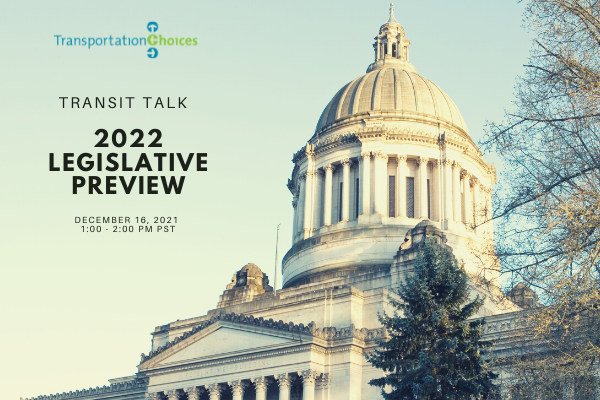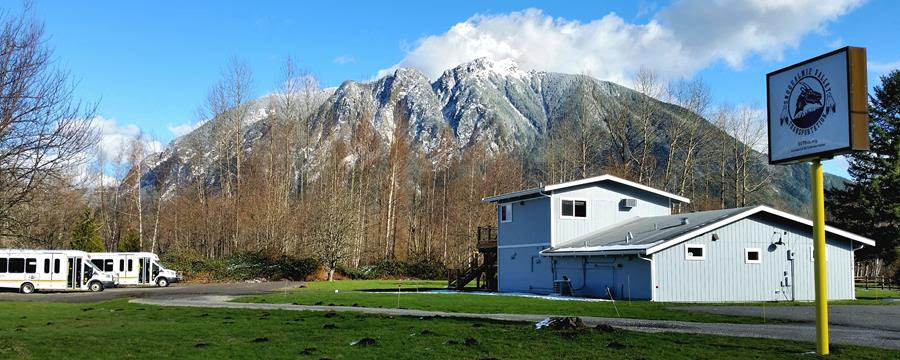
Snoqualmie Valley Transportation office, North Bend, WA. Photo by Amy Biggs
TCC News
A Fond Farewell to TCC’s Operations Manager, Jaclyn
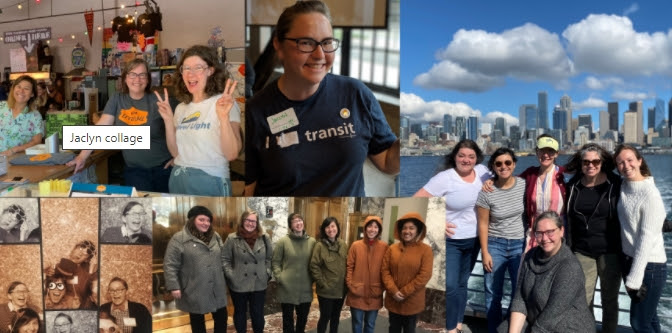
It’s with a healthy mix of joy and sadness that we announce the departure of TCC’s Senior Operations Manager, Jaclyn Gault, after more than four years at the organization.
Jaclyn’s impact will be felt for years to come — she has lived and breathed TCC’s strategic goal of operational excellence, adding structure, organization and processes that would make any nonprofit director envious. A person of many passions and talents, Jaclyn also found creative and inspiring ways to meld her artistic skills with our transportation work, including creating beautiful, custom transit stamps that we sold through TCC’s staff “store” (which was also inspired, developed, and made possible by Jaclyn!).
We are thrilled that Jaclyn is staying within the transit world, working on equitable community engagement for Sound Transit’s Everett Link extension starting in December. Congratulations and thank you Jaclyn!
Upcoming Transit Talk: 2022 Legislative Priorities Preview
Join TCC for our last Transit Talk of the year, Thursday, December 16 from 1-2 pm. We’ll be previewing our legislative priorities for the 2022 session. You’ll hear from moderator Bryce Yadon, State Government Affairs Representative for TCC, Senator Rebecca Saldaña representing the 37th district, and Samuel Martin, Lead Advocate for WA for Black Lives.
Washington state legislative session is right around the corner and TCC is ready to fight for transit! From institutionalizing equity to planning for affordable, sustainable, and healthy transportation, a better future #TakesTransportation!
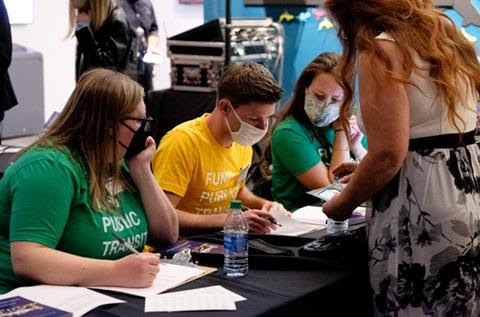
Volunteer with TCC during the 2022 Legislative Session!
TCC is gearing up for the 2022 legislative session and we’re recruiting volunteers to support advocacy efforts for our transit priorities. Opportunities will include writing letters, making phone calls to legislators, and sending action alerts for key transit bills. We would love your support! All volunteer opportunities will be remote for the time being. If you are interested in participating, please email McKenna Lux, TCC’s Engagement & Events Manager, at mckenna@transportationchoices.org.
New FUND PUBLIC TRANSIT Baby Onesies and Toddler Shirts
Yep, we did it! Why should grown ups have all the FUND PUBLIC TRANSIT fun? You’ve seen the buzz about TCC’s exclusive FUND PUBLIC TRANSIT t-shirts, sweatshirts, and hoodies — now even the smallest transit riders can sport their love for public transit in a baby onesie or a toddler tee. And while you’re at it, you can upgrade your tee with a snazzy, new V-Neck style, or a cozy hoodie for winter bus rides.
P.S. Remember to snag a new mug or tote for all your fave commuting co-workers. Have yourself a festive FUND PUBLIC TRANSIT holiday season!
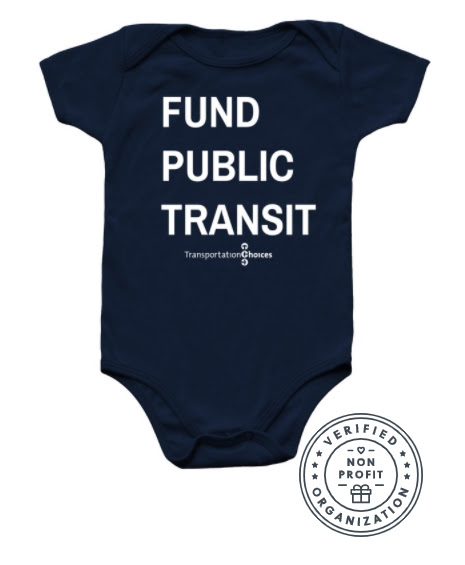
Mobility Justice
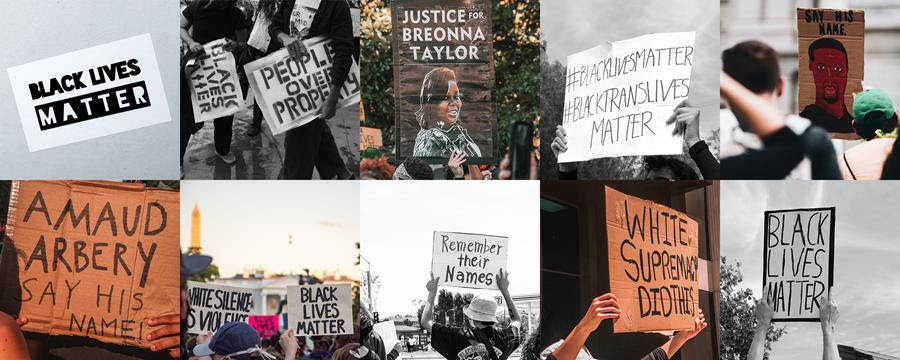
Commentary: The Transportation Sector Has a Responsibility to Lead on Equity. Here’s How.
Mass Transit — November 7, 2021
“Transit management should be reflective of the communities served through initiatives that deliver measurable impact to both business and community.”
L.A. Times Analysis Shows Racist Harms of Freeway Projects
Streetsblog LA — November 12, 2021
“The Times examined three decades of freeway expansion projects in five states – California, Florida, Mississippi, North Carolina, and Texas – and found that large highway building projects demolished homes predominantly (nearly two-thirds) in Black and Latino neighborhoods.”
And this is why it’s useful to talk about historical examples of institutionalized racism
The Washington Post — November 8, 2021
“When the Hill shared a video of Buttigieg making that claim, it quickly (again) became a focus of mockery among right-wing commentators and some Republican politicians. But in short order, Buttigieg’s comments also served as an opportunity not only to elevate the specific story to which he was referring but the utility of educating Americans about a complicated history of systemic racism.”
‘The Wrong Complexion For Protection.’ How Race Shaped America’s Roadways And Cities
NPR — July 5, 2020
“The highways and public spaces that shape our cities were often intentionally built at the expense of Black, Latino and other minority Americans.”
How Segregation Caused Your Traffic Jam
The New York Times — August 14, 2019
“In some of America’s most congested cities, roadways were designed to keep people “in their place.””
Robert Moses and His Racist Parkway, Explained.
CityLab — July 9, 2017
“Robert Moses ordered engineers to build the Southern State Parkway’s bridges extra-low, to prevent poor people in buses from using the highway. The truth? It’s a little more complex.”
Recent News
All Seattle public middle school students now eligible for free ORCA card (Metro Matters — November 5)
“Seattle Public Schools and the City of Seattle are partnering to provide an additional 8,000 ORCA cards to Seattle Public Schools’ middle school students.”
Bipartisan Infrastructure Law (USDOT — November 30)
“This website will serve as your one-stop shop for FHWA’s implementation of the Bipartisan Infrastructure Law, including everything from fact sheets and funding notices to guidance, regulations, and presentations.”
Being car-less means cold waits, long trips: It’s ‘exhausting’ (HeraldNet — November 1)
“The Week Without Driving challenged policymakers and planning professionals to ditch their vehicles.”
Public Transit Use Must Double to Meet Climate Targets, City Leaders Warn (CityLab — November 10)
“As COP26 events focus on electric vehicles, a new report calls for $208 billion in annual public transit investments to decarbonize transportation.”
A Primer on Vehicle-Miles-Traveled Taxation Concepts (California Globe — November 10)
“A very few states have already and/or are conducting pilot programs to test the idea and California and the federal government are in the process of evaluating how a VMT tax would work.”
Car-Free Transportation Gets Boost from U.S. Grant Program (CITYLAB — November 29)
“In the new tranche of almost $1 billion in RAISE grant selections from the U.S. Department of Transportation announced earlier this month, roads were the losers.
Congress mandates new car technology to stop drunken driving (AP News — November 9)
“Each year, around 10,000 people are killed due to alcohol-related crashes in the U.S., making up nearly 30% of all traffic fatalities, according to NHTSA.”
Jumping Onboard: What Rail’s Resurgence Means For Efforts To Decarbonize The Pacific Northwest (Investigate West — November 18)
“Rail advocates argue new lines will grow the region economically by providing better connections between cities and evening out mobility inequalities, while also contributing to decarbonizing the region.”
Sound Transit marks halfway point in Lynwood Link construction (Mass Transit — November 24)
“Construction of the Lynnwood Link project, which will extend Sound Transit’s Link light-rail 8.5 miles into Snohomish County, reached the 50 percent completion mark.”
Community Transit Kicks Off Lynnwood Link Bus Restructure Process (The Urbanist — November 16)
“Initial priorities for Community Transit’s 2024 bus restructure include more frequent service, direct connections to light rail, the ability to tailor service to local needs, and the provision of service solutions by geographic area.”
C-Tran might lower its fares (The Columbian — November 4)
“C-Tran is considering lowering its rates next year, a temporary measure meant to help those who rely on public transit, and also because tax collections exceeded its projected budget for 2022.”
Major construction contract marks milestone in King County Metro’s battery-electric bus efforts (Mass Transit — November 24)
“The design-build contract for the electrification infrastructure needed to charge and operate the agency’s buses was awarded to the Walsh-Stantec Progressive Design-Build Team.”
Sound Transit Begins Evaluating Trains on Light Rail Tracks in Bellevue (Downtown Bellevue Network — November 12)
“These evaluations will help to move closer toward the opening of East Link. They will be happening from Bellevue Downtown Station to Redmond Technology Station.”
Take Action
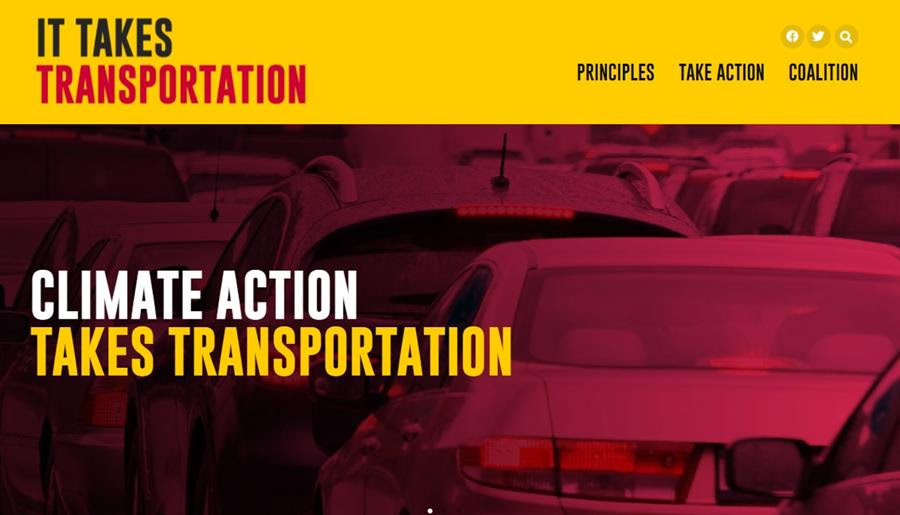
Washington state legislators are long overdue to pass a transportation package — but we don’t need just any kind of investment. We need a transformative approach to transportation that meets our needs for health, safety, and affordability, and addresses climate, social, and economic justice. Join us in telling legislators that a better future #TakesTransportation.
Mission in Motion
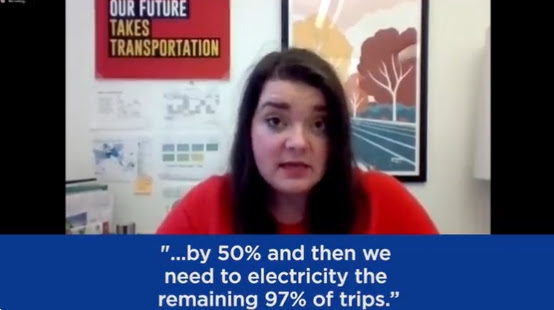
Last month, TCC’s Executive Director, Alex Hudson, was a featured guest on TVW’s “The Impact” to discuss how Washington state leaders should spend federal transportation infrastructure dollars. Hudson made a case for state legislators to “prioritize active transportation and public transit” and invest in fully funding our state’s transportation needs: “To meet this state’s established climate goals we need to reduce vehicle miles traveled by 50% and then we need to electrify the remaining 97% of trips.”
Get Engaged
Weigh in on Community Priorities for Lynnwood City Center Transit-Oriented Development
Sound Transit is expanding Link light rail service from Northgate into Snohomish County, including a new station in Lynnwood planned to open in 2024. They purchased property next to the future Lynnwood City Center station that will be available for development after construction. Tell Sound Transit what kind of services and spaces would benefit your growing community!
Share your e-bike story!
Have e-bikes changed your life? Share your story with Cascade Bicycle Club today to help them communicate the value of bike-friendly policies!
Add your voice: helmets, yes; helmet laws, no
Join Cascade Bicycle Club in making sure county leaders know that there is broad community support for decriminalizing helmet usage, a decision that will help mitigate inequitable enforcement and focus on ways to make our streets safer for all. Take one minute to send an email to officials.
Call for Papers on the Special Issues: Equitable Active Transportation
Studies point to inequities among socio-economic and demographic groups in access to infrastructure for active travel, the use of active travel modes, safety of active travel, and predominant cultures of active travel (such as male-oriented bicycling groups and gender stereotypes). These inequities call for extra attention from scholars and practitioners to the planning and deployment of an equitable active transportation system.
Survey to understand desire for BIA-funded programs and services
A business improvement area (BIA) is a way for neighborhood property owners to join together to fund programs and services including safety patrols, outreach workers, community ambassadors, cleaning activities, and beautification efforts. The Everett Station District Alliance (ESDA) wants to understand the interest of property owners to receive programs and services that could be funded by a BIA.
PSRC Future Transportation Survey
PSRC is developing the next Regional Transportation Plan, which will describe how the region will meet transportation needs into the future, addressing existing needs and future growth. The plan is updated every four years per federal law and will respond to the priorities and growth strategy identified in VISION 2050.
Support Our Resilience + Recovery Fund

Transit and inclusive transportation options will be an integral part of Washington’s recovery as well as an important piece of our continued effort to correct racial and economic injustice. In the months and years ahead, our efforts to fund transit in Washington will be more necessary than ever. Join us in donating to the Fund today.
Staff Pick
9 Reasons to Eliminate Jaywalking Laws Now
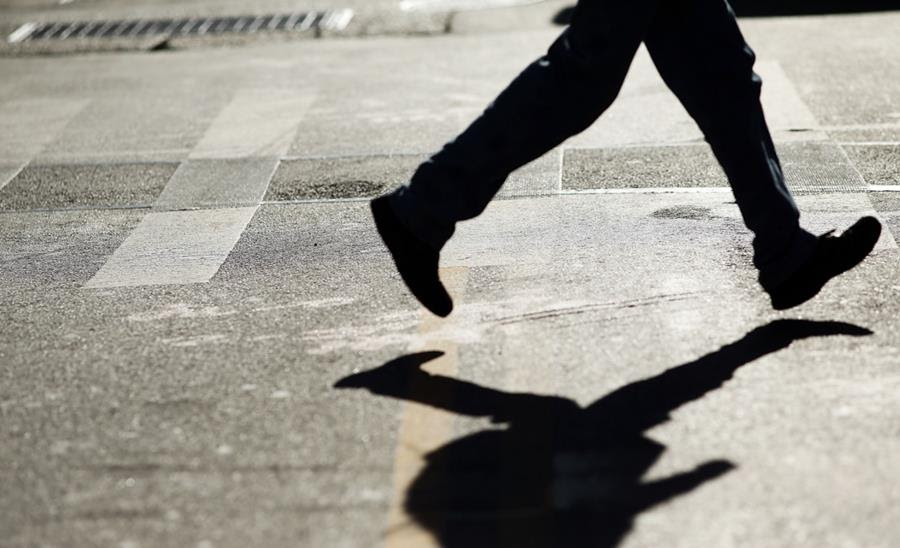
This joint piece by mobility justice advocates Charles T. Brown and Angie Schmitt takes on jaywalking with perfect precision, data, and a racial justice analysis.

Hester Serebrin
Policy Director
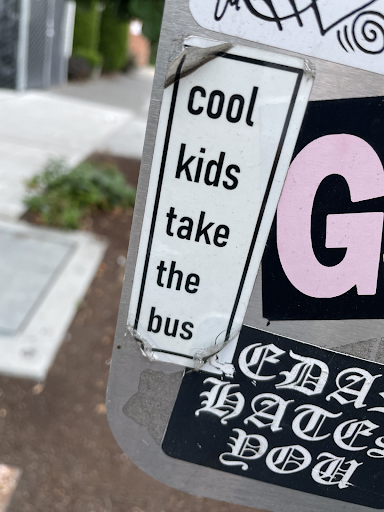
Awesome sticker by Unknown. Photo by Hester Serebrin.
Want to get this newsletter delivered straight to your inbox? Join our mailing list.

